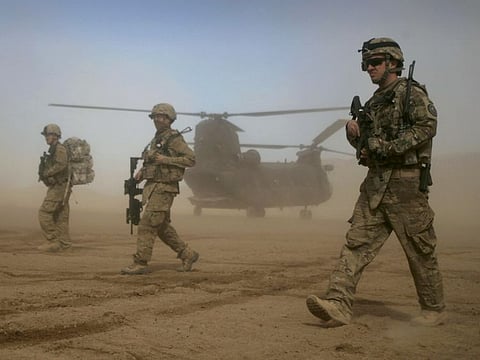Biden’s miscalculations on Afghanistan
US president insisted the mission in Afghanistan has been accomplished

Cairo: “With the terror threat now in many places, keeping thousands of troops grounded and concentrated in just one country at a cost of billions each year makes little sense to me and to our leaders.”
So said US President Joe Biden in April as he announced a complete withdrawal of US forces from Afghanistan by September. “It’s time to end America’s longest war,” he added.
Biden’s announcement was significantly made at the same room in the White House where then president George W. Bush declared the US invasion of Afghanistan in October 2001 less than a month after the 9/11 terror attacks.
Dramatic developments have since happened, prompting Washington to change its mind about keeping mired in Afghanistan’s turbulence. Over 100,000 Afghan civilians are estimated to have been killed, along with 45,000 members of the Afghan security forces, and at least 3,500 members of the US and coalition troops in the past two decades. Ominously, Afghanistan’s Taliban, whom the US removed from power in 2001, have staged a powerful resurgence.
“The American troops’ withdrawal from Afghanistan came at a very crucial time when the peace process kept faltering,” said Rania Makram, an analyst at the Cairo-based Al Ahram Centre for Strategic Studies. “But the US is no longer ready to bear burdens of its security presence there as it has changed its strategic priorities,” she added.
On invading Afghanistan on October 7, 2011, the US declared that its objective were to dismantle Al Qaida and ensure that the country will no longer be used as a springboard for terror attacks. In May, 2011, Al Qaida supremo Osama bin Laden was killed in a US special raid in Pakistan.
Turmoil in Afghanistan, including deadly Taliban attacks on foreign soldiers, has been overshadowed by another equally prolonged US war in Iraq.
Biden insisted the mission in Afghanistan has been accomplished and it is time to leave once and for all.
Four months down the lane, Taliban are in control of Afghanistan. Top Taliban leaders, declared victory. The militant group took over the presidential palace on Sunday shortly after American-backed President Ashraf Ghani fled the country, and said it plans to soon declare a new “Islamic Emirate of Afghanistan.”
“Today is a great day for the Afghan people and the mujahideen. They have witnessed the fruits of their efforts and their sacrifices for 20 years,” Mohammad Naeem, the spokesman for the Taliban’s political office, told Al Jazeera TV.
In 2020 US and Taliban signed a historic deal, setting a timetable for withdrawal of American troops from Afghanistan and committing the militant group to halt attacks on Americans and start peace talks with the Afghan government.
When coalition troops kicked off pullout from Afghanistan last May, Taliban insurgents initiated a large-scale offensive and now they are in charge of the country.
“The situation has always been in Taliban’s favour,” said Salah Al Hadi, an Egyptian analyst, had said. “Politically speaking, Taliban had become a major player in Afghanistan the day they had signed a deal with Americans and the unconditional US withdrawal.”









